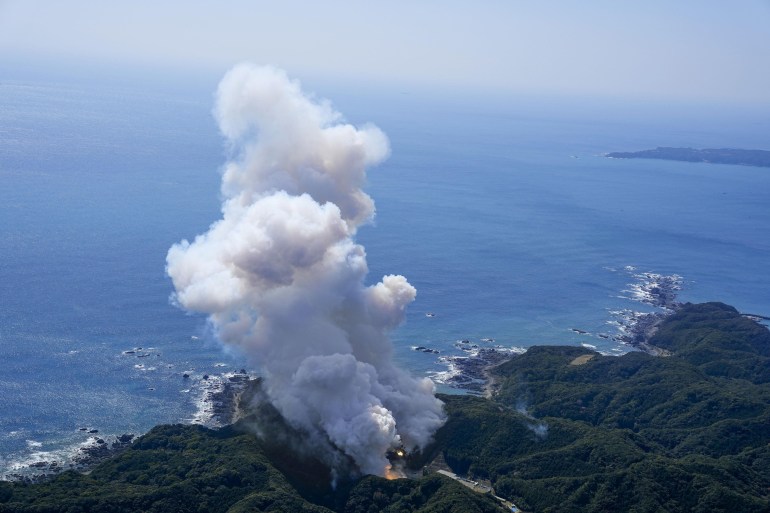Tokyo-based startup Space One was aiming to become the first private Japanese company to put a satellite into orbit.
A small Japanese rocket exploded shortly after launch in a blow to Tokyo-based startup Space One's attempt to become the first domestic company to put a satellite into orbit.
The 18-meter (60-foot) solid-fuel, four-stage rocket called Kairos exploded into pieces seconds after launch at 11.01 a.m. (02:01 GMT) on Tuesday, filling live broadcast screens with images of flames and clouds. Smoke rising. Burning debris could be seen falling onto the surrounding mountain slopes as sprinklers began spraying water.
Space One said the flight was “stopped” after the launch from the mountainous Kii Peninsula in western Japan, and it was investigating the situation.
There was no immediate indication of the cause of the explosion or whether there were any injuries. Space One said the launch was highly automated and required only about a dozen staff at the ground control center.
Kairos carried an experimental government satellite capable of temporarily replacing intelligence satellites in the event of their failure, and was supposed to put it into orbit approximately 51 minutes after launch.

Although Japan is a relatively small player in the space race, the country's rocket developers are scrambling to build cheaper vehicles to meet growing demand for satellite launches from the government and global customers.
Space One was founded in 2018 by a group of Japanese companies including Canon Electronics, IHI Aerospace, construction company Shimizu and the government-backed Development Bank of Japan.
Space One wants to offer “space courier services” to domestic and international customers, with plans to launch 20 rockets a year by the late 2020s.
Last July, another Japanese rocket engine exploded during testing about 50 seconds after it ignited.
The solid-fueled Epsilon S rocket was an improved version of the Epsilon rocket that failed to launch last October.
Its test site in northern Akita Prefecture caught fire and a huge column of gray smoke rose into the sky.
Last month, the Japan Aerospace Exploration Agency (JAXA) celebrated the successful launch of its new flagship H3 rocket, after years of delays and two previous failed attempts.
The H3 has been mooted as a competitor to SpaceX's Falcon 9, and could one day deliver cargo to bases on the moon.
The Japan Aerospace Exploration Agency's successful launch followed Japan's landing of an unmanned probe on the moon's surface in January, making it only the fifth country to achieve a “soft landing” on the moon's surface.




/cdn.vox-cdn.com/uploads/chorus_asset/file/25550621/voultar_snes2.jpg)

More Stories
Two children killed, 11 injured in stabbing attack at Taylor Swift dance party in UK, 17-year-old arrested
Fiber optic communications networks are being sabotaged – DW – 07/29/2024
Putin warns US against deploying long-range missiles in Germany | NATO